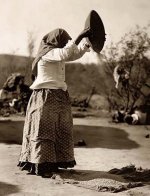 Every year the bandits would descend at harvest time on the little country town and steal the harvest. The villagers were so frightened and browbeaten that they threshed their grain a little at a time in the caves. They needed men to deliver them. They needed men skilled at war, and unafraid. They got them – but only a few to go against so many. This sure sounds like the plot of Kurasawa’s The Seven Samurai (or The Magnificent Seven, or A Bug’s Life), but this story is much older than that. This happened in the late second millennium B.C. The Jews were living in caves, and threshing their grain in caves, cowering in fear of marauding Midianites. Their reluctant deliverer was Gideon, and his small band of soldiers. Their story is found in Judges 6-7.
Every year the bandits would descend at harvest time on the little country town and steal the harvest. The villagers were so frightened and browbeaten that they threshed their grain a little at a time in the caves. They needed men to deliver them. They needed men skilled at war, and unafraid. They got them – but only a few to go against so many. This sure sounds like the plot of Kurasawa’s The Seven Samurai (or The Magnificent Seven, or A Bug’s Life), but this story is much older than that. This happened in the late second millennium B.C. The Jews were living in caves, and threshing their grain in caves, cowering in fear of marauding Midianites. Their reluctant deliverer was Gideon, and his small band of soldiers. Their story is found in Judges 6-7.
It struck me that the one thing essential to threshing grain, as it was done in the ancient world, would be absent in a cave – wind. When the grain had been beaten to separate the chaff from the kernel, the whole lot would be scooped up, shovel-full by shovel-full, and cast into the air. The heavy grain would fall to the ground, and the chaff would blow away. Even if you had a cave with more than one point of access from outside, so that there was a flow of air, where would the chaff go? Threshing grain in a cave would be about as successful an endeavor as pushing Sisyphus’ stone, or harvesting Tantalus’ grapes.
Israel was in this predicament because of their faithlessness and their idolatry. They left Yahweh, who had given them every good gift, for the fertility gods of the Canaanites – and ended up with empty bellies, hiding in caves – and refusing to return to God. Look at the utter ridiculousness, the pathetic state our sin reduces us to, I thought, and yet we go on beating grain in a cave, choking on the chaff, hoping things will somehow turn around without having to truly repent.
They were threshing grain in caves because of their sin….
…and because they were afraid.
Notice that Gideon’s feelings about God are not characterized by unbelief, but by resentment and anger. He is angry that he has to be afraid, and he blames God for that fear. “Where are all the miracles our father’s spoke about?” he demands of the Angel (6.13). We are often the same way – afraid of the way things are, angry at God for letting us be afraid, defiant in our fear, determined to hide. And yet….God didn’t mess things up – we did, and we continue to, and even so – the sun rises, the rain falls, the earth cradles life, and love persists. God is, and God is good.
We were given much to process this last weekend – both in the presentations of John Clayton, and in the report Sunday evening of Jerris Bullard. As I thought about the two men, and their presentations, it occurred to me that in matters of faith and evangelism we are often like the Israelites of Judges 6 - hiding in our enclaves, trying to hold on the little left to us by a secular, hostile world. It was encouraging and inspiring to see that our brethren in Imphal, who face attacks from the kind of marauders and terrorists one sees in The Seven Samurai, The Magnificent Seven, and A Bug’s Life, aren’t hiding at all.
They erected the biggest building in town, announcing “We Christian’s are here,” to everyone in the neighborhood. They are visibly doing good (Matthew 5.13-16) and God is being glorified as a result. I hope that we have gained some measure of their confidence to face our world, instead of hiding from it. We are, already, more than conquerors (Romans 8.37). The rightness of our faith is confirmed by the reasonableness of it, and the result of it. Let us live in the light, as children of the Day (I Thessalonians. 5.5), as the sources of light we are (Matthew 5.14).
Light, as Jesus points out in the passage we referenced above, isn’t given to be hidden in under a basket. It isn’t meant to be hidden in a cave either.